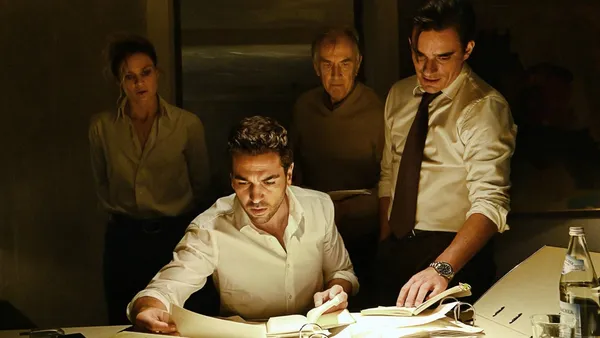 |
| The Collini Case |
One day an elderly man, played by Franco Nero, walks into a luxuriously appointed building, travels up to the top floor and shoots the man he finds there dead. He then returns to the lobby and sits down, waiting for the police to come. He offers no defence for his actions. Recently graduated young lawyer Caspar Leinen (Elyas M’Barek) is charged with defending him anyway – despite having spent part of his childhood with the murdered man.
The Collini Case is a mystery of the sort that rarely come along in cinema these days. It’s a beautifully shot, powerful piece of cinema with its roots in German’s troubled past. Now, two years after its completion, it’s finally getting a release in the UK, so I met up with director Marco Kreuzpaintner and began by asking him about his familiarity with the Ferdinand von Schirach novel on which it’s based.
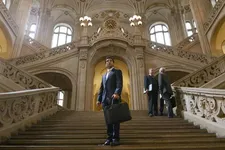 |
| Caspar is caught up in something much bigger than himself |
“I knew about the novel. I hadn't read it,” he says. “I've read other Ferdinand von Schirach stuff and as you might know, in Germany he's quite a recognised writer and has this very distinguished, dry, almost emotionless way of telling these cases. And, actually, that makes it compelling, because it is, obviously, the horror of bureaucracy behind especially that case, I think that makes the personal drama behind it, or the thousands of personal dramas behind it, so compelling.”
A lot of directors would have taken the easy route of ramping up the emotion in the novel. Why did he decide to do things differently and focus on its intellectual dynamics for much of the running time?
“As I director I like always first to serve the story and serve where it comes from. Especially when there is a book that so many people have read, then you're always in a tricky situation anyways, because everybody has their own movie already in their head. And you're now the person who has to put the images to that, which is a Catch 22 as again, you never can succeed on all levels, you just try to do your best. In these terms, I think you're doing the best when you when you stick as close as possible to the tone of the writing.”
There’s an additional layer of complexity to this story because von Schirach’s grandfather was a Nazi and the story was influenced by real events.
“ I had lots of material that I needed for research, but also insights that went much further than what was actually in in the novel,” he says. “Obviously, as you can imagine, in Germany we grow up with this collective guilt. You still have to be apologetic about it but I think we’ve dealt with it in a very decent way with it over the years now. I think that our governments have done a great job in bringing us up in the sense of feeling that responsibility of history, to make sure 100% that nothing like that can repeat again.
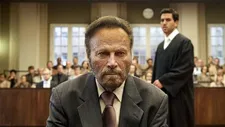 |
| The killer offers no defence |
“That said, I always felt like I grew up in the Federal Republic of Germany, where all these horrendous crimes, murders, the Holocaust, all of that was committed, but then we went into something that we call our democracy where little did I know and little were we taught that obviously you can't make the collective guilt of a country, mainly represented in the people who were in the party and people were the Nazis, disappear just by like saying, ‘Oh, now it's a new republic.’ These people were still existing and they were running the country.
“I think that something also in history writing that is a little bit underrepresented is, the UK, America, France and Russia, in order to give this country a future, they had to rely on the same people who committed the Holocaust on the lower level to still continue running it. So all of a sudden, they didn't want to know anything about like the past anymore. Everybody's like, ‘I have no idea,’ and whenever you dared to bring it up it was like, ‘Well, we didn't know about the concentration camps.’ Come on, guys! I mean, I know from other elderly family members, everybody knew Everybody knew, they just didn't want to know.
“So these people now in power had a big interest, obviously, that their past was kept under the carpet and under a code of silence. And so the man who actually became the head of the Justice Department in Germany was himself a big Nazi and the judge at the criminal court in Innsbruck, Austria, where he sentenced people to death, like, they were just stealing food, so he was like, one of the worst. So this guy was made by Adenauer, by the Chancellor, like the head of the Justice Department.
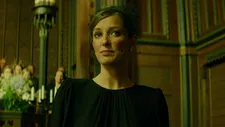 |
| Caspar's girlfriend - the granddaughter of the man his client killed |
“That’s outrageous already, but then in 1968, what we would now probably call the beginning of the modern world, when all the humanitarians, the student revolutions in our countries kicked in, they all of a sudden felt the threat that this next generation will not let them get away with it. So they were under big pressure to get these laws somehow sorted into their favour. And then in 1967 or 1968, they came up with a law which on the surface had a completely different meaning. It was about minor crimes. It said when you not intentionally out of personal motives, committed any kind of killing, then they couldn't be shown as murders. They were only manslaughter and manslaughter in Germany falls under – I think you call it statute barred. So they become statute barred after 20 years.
“So you can do the math. All these war crimes, all these horrendous desk criminals of the Nazis, all these ones committed real war crimes where they just said like it was the common treatment of these cases. All of a sudden you couldn't go after them. That shook my view of the world quite a lot.”
I note that the film has a theme of vergangenheitsbewältigung, going back into the past and looking at the past and at relationships with fathers.
He nods. “For Schirach there’s a personal motive right because his grandfather was the head of the Hitler unit and that's obviously like a big family and baggage to carry. If you allow me, a little bit, my revenge to history, I made out of Casper Leinen, who he had written as a straight white guy, I felt like casting him with a Turkish actor. He’s not Turkish really, he’s half Tunisian and half Austrian, but in Germany everybody thinks he's Turkish. But, like, to have him almost like trying, in the Federal Republic of Germany, to become the better person by helping people who are immigrants and stuff like that, I found that added a discussion.”
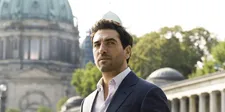 |
| The specificity of locations matters |
It also complicates Caspar’s social position and his relationship with the deceased man’s granddaughter, played by Alexandra Maria Lara, he observes. “She's all nice and liberal and studies in London. It's like this cosmopolitan world but when it comes to revealing the background of the family story all sudden a line comes across her lips that is like ‘What would you do without Grandfather? You probably would stand in a shop and sell things,’ you know?”
I ask if it was difficult to bring depth and complexity to Caspar, given that he’s an earnest young man who wants to do what’s right and it would be easy for that to lapse into cliché.
“Oh, that's such a difficult question,” he says. “I just put it out of my thoughts, you know, very frankly. It's nothing that I intellectualise. I knew, obviously, that Elyas, the actor who plays Caspar, has mainly done comedy, so it’s a little bit doing, like, a Matthew McConaughey with him – bringing a surfer dude into serious subject matter, which you can understand is a very risky thing, because they have their fan group, and reviewers don't like these kinds of actors normally very much, you know. And so there was a certain kind of risk to it.
“I knew Elyas personally, I knew that he was very well read, even though maybe not part of intellectual discussions, that he had a quite frank point of view. He's somebody like deals with humanitarian rights on many levels. So there was lots of personal things that we could discuss. And then I think that's part of directing something like this, then obviously, you deal with stuff that you yourself might be bothered about in society, and so you bring that persona in a way into that character. And then hopefully, that makes it complex.”
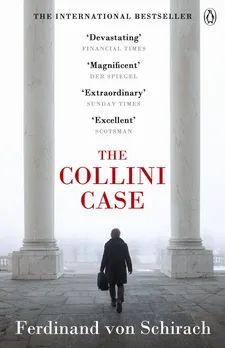 |
| The Collini Case book by Ferdinand von Schirach |
At the same time, he was working with the legendary Franco Nero, which must have been intimidating.
“I thought so in the beginning, but he is a very kind person. He invited me to Rome before we started working. Obviously, I was intimidated. I mean, him and Tarantino, for example, they're still like once a week on the phone, and Django as much as it means or doesn't mean to film history is obviously a character that had an impact on the whole generation. But he is a very humble actor that I would say he was the easiest of all.”
We discuss the differences in the way that the characters perceive and are shaped by time, and Marco raises a line which is thrown at Caspar.
“He says ‘You're sitting here in full dignity of your late birth,’ which is a quote that lots of Nazis in Germany brought up against the younger generation. They said, ‘You speak easily but if you would have been born at the time, what would you have done? You would have become beheaded just for your opinion? No, you would have run like everybody else.’ And then you say, ‘Not true,’ because there were obviously people who didn't do that. Or at least who didn't take part in that system. There were ways like to get around it.”
The way that different times are presented to viewers is also interesting, with the Eighties scenes shot on film and some quite distinctive approaches to lighting in different periods.
“It always starts like with the form of things,” he says. “You want to make sure that an audience knows where we are now. For me, I grew up filming on film Stockstill, you know? To me it was pretty new. Only since eight years I'm shooting digitally. I still don't like it as much. There's just a certain kind of magic of hearing the camera rolling and yes, I mean, once in a while you have a technical problem, but it's just that there's more concentration there. Also, the film stuff is so precious and expensive. People have a different kind of concentration, which, obviously, means they're going to need to go deeper. Everything becoming so easily reproducible and available is good in a lot of terms. But when it comes to attention spending, it might not be.
“I'm a kid of the Eighties – I was born in 77. So I wanted, in these few flashbacks that I had, to give it a little bit of what my feeling of life was back then. And then the 1945 story, you could have said would have made sense also shooting on film, but we thought it was maybe too simple. So we just shot that on different lenses, and also digitally, but then gave it a distinguished look that we thought was appropriate for that.”
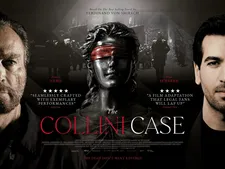 |
| The Collini Case English poster |
The specificity of the locations is also a great strength of the film.
“Yeah, it is. As you know, there's always this critical moment when the budget becomes a reality and producers come to you and say ‘Couldn't we shoot Italy in Brandenburg?’ No, absolutely not. I mean, on television, this has become such a common thing, right? Because how many people still bother? Have you already like educated the people just like to believe when they see a little bit of water and a certain shade of boats, that this is Venice? I hope not. Bu sometimes you have the feeling that they get away with it. And no, I couldn't do this. It is also about the faces. You want the extras and the people on that square in Italy so it will be like Italy. That was very important to me. And then obviously, like Berlin, and its brutalism and all of that – it’s a nice contrast.”
And then when it comes to the courtroom scenes, there are so many courtroom dramas out there, how does one take that kind of set-up and make it one’s own?
“First, you build that bigger than it really is, because you need space in order to not make it tedious. And on the other hand you don't want to have the actors like in America, the lawyers and the defence – that’s theatre, right? It's not anymore about the case, it's all about emotions and how they emotionalise the jury. Luckily, we didn't have a jury. We don't have this kind of thing but there's obviously still a certain kind of argumentation and how the defenders or the accusers bring the subject matters up.
“In a weird way, it is also an ego driven kind of field where, especially when it comes to men. I wanted to have a female judge because I felt like it just had to be, but I wanted to see how the boys and the misogynist, ego-driven, old fashioned – because it still takes place in the 2000s right? Like, if you look back 15 years, this was all before #MeToo obviously, where these animals “ – he pauses, apologising for using that term, but clearly means what he said - “behaved really bad. And I just find that also interesting that when you look to the history – and 2001 is history – to not just give them different kinds of clothes, but show that the dynamics and how people acted in a different way.
“With the camera, as you might have seen, I really love camera movements. To stage it in an interesting way where you have the twists, but also the camera, there's a twist where you actually feel ‘Something happened to me!’ and it gets physical, therefore you need a certain kind of set. So we built it into a public building. We had to take out of structure, but the infrastructure was built in.”
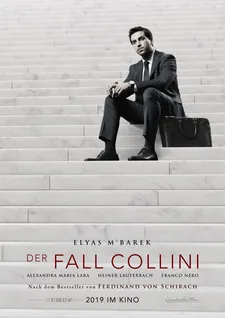 |
| The Collini Case German poster |
He has had a really long journey with the film, with it gradually getting released in different places. Does you have anything to say now to people who are going to be seeing it for the first time?
“I'm just glad you like it. In these times where you wonder if streaming, in the long term run, will destroy cinema when it comes to interesting films, because the distributors of films these days are very tempted to say, ‘Oh, you know, you just need to have a roller coaster ride these days to get the people out into the movie theatres.’ I think not, I hope that there are still lots of moviegoers, especially in Great Britain, who are starving for like, something that is smarter and that you can watch in a more concentrated way.
“I think it also it could maybe start a discussion on how to deal in England a little bit more with the past of the country, like what is taught about this time period, like of imperialism, and so on. I think we should step away from just pointing fingers and always start with ourselves. And maybe by watching this specific German case, people in Great Britain will make up their mind and say like, actually true, we need something like that.”
He has recently been working on the TV series Extinction for the BBC, and although he does have some possible projects lined up in the future, which he’s not allowed to talk about yet, he’s also keen to enjoy some well-earned rest,
“I’m just off over 100 shooting days, wrapped. So at the moment, I don't want to see a set” All I want to do is read and wrap my mind around it to get excited about a project.”
The Collini Case opens in cinemas on 10 September and On Demand 11 October. Find out more at https://www.thecollinicasefilm.co.uk





















